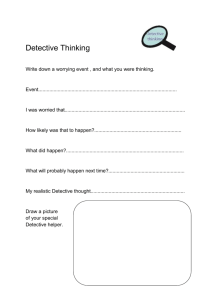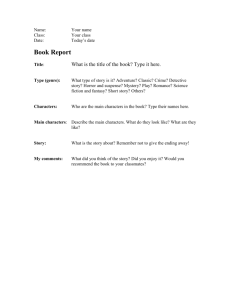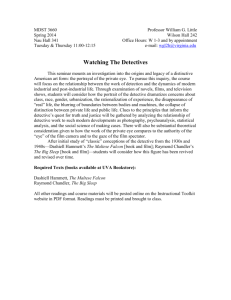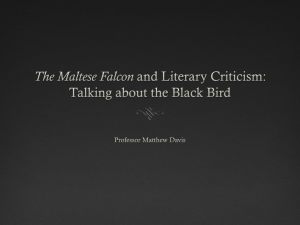Syllabus
advertisement
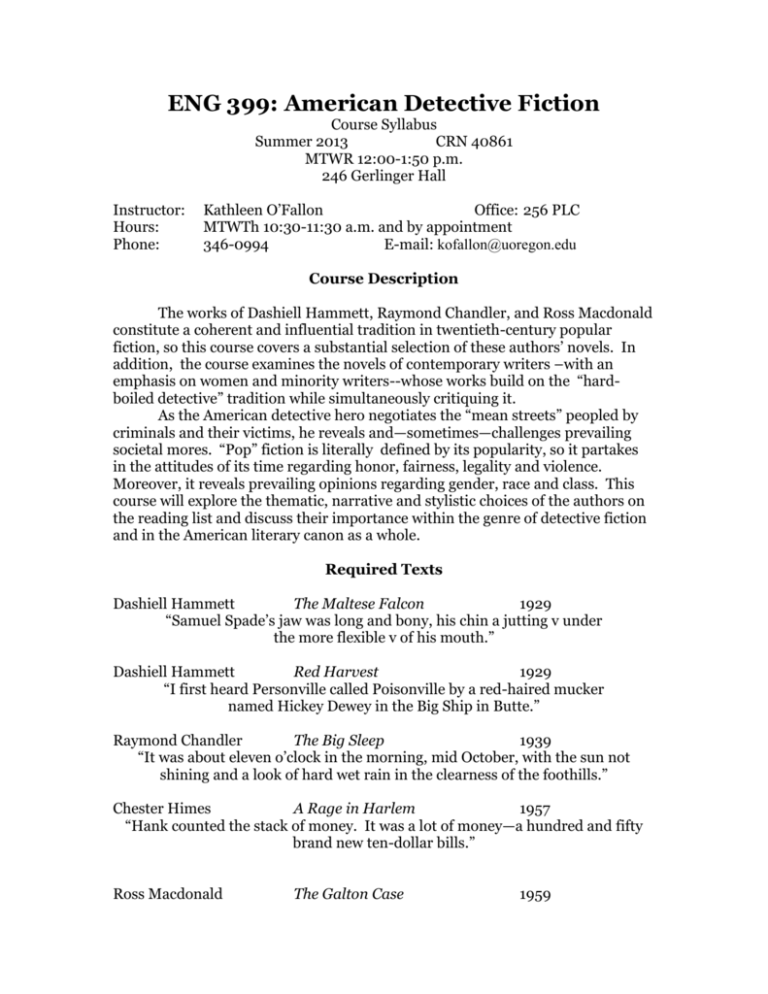
ENG 399: American Detective Fiction Course Syllabus Summer 2013 CRN 40861 MTWR 12:00-1:50 p.m. 246 Gerlinger Hall Instructor: Hours: Phone: Kathleen O’Fallon Office: 256 PLC MTWTh 10:30-11:30 a.m. and by appointment 346-0994 E-mail: kofallon@uoregon.edu Course Description The works of Dashiell Hammett, Raymond Chandler, and Ross Macdonald constitute a coherent and influential tradition in twentieth-century popular fiction, so this course covers a substantial selection of these authors’ novels. In addition, the course examines the novels of contemporary writers –with an emphasis on women and minority writers--whose works build on the “hardboiled detective” tradition while simultaneously critiquing it. As the American detective hero negotiates the “mean streets” peopled by criminals and their victims, he reveals and—sometimes—challenges prevailing societal mores. “Pop” fiction is literally defined by its popularity, so it partakes in the attitudes of its time regarding honor, fairness, legality and violence. Moreover, it reveals prevailing opinions regarding gender, race and class. This course will explore the thematic, narrative and stylistic choices of the authors on the reading list and discuss their importance within the genre of detective fiction and in the American literary canon as a whole. Required Texts Dashiell Hammett The Maltese Falcon 1929 “Samuel Spade’s jaw was long and bony, his chin a jutting v under the more flexible v of his mouth.” Dashiell Hammett Red Harvest 1929 “I first heard Personville called Poisonville by a red-haired mucker named Hickey Dewey in the Big Ship in Butte.” Raymond Chandler The Big Sleep 1939 “It was about eleven o’clock in the morning, mid October, with the sun not shining and a look of hard wet rain in the clearness of the foothills.” Chester Himes A Rage in Harlem 1957 “Hank counted the stack of money. It was a lot of money—a hundred and fifty brand new ten-dollar bills.” Ross Macdonald The Galton Case 1959 “The law offices of Wellesley and Sable were over a savings bank on the main street of Santa Teresa.” Sara Paretsky Indemnity Only 1982 “The night air was thick and damp. As I drove south along Lake Michigan, I could smell the rotting alewives like a faint perfume on the heavy air.” Walter Mosley Devil in a Blue Dress 1990 “I was surprised to see a white man walk into Joppy’s bar.” Course Requirements 1. Reading of all assigned texts, to be completed by the second day each appears on the schedule. (First day discussion will avoid plot points, so as to avoid ruining the ending for those not finished, but no such courtesy will be extended on the second day.) We will be reading two novels a week, so it’s imperative that you don’t fall behind. 2. Prompt and regular attendance and participation in class discussion. Students are expected to be present, both physically and mentally. This means having your texts with you, tuning in to discussion, taking notes regarding important concepts, and offering commentary on assigned novels that is backed up by textual evidence. On the first day a novel is discussed, all students will be asked to read a favorite line/passage from the novel and explain why they chose it. The selection should exemplify an important element of the writer’s style or reveal something significant about characters, plot or themes. Because these selections will determine the initial direction of discussion, be thoughtful in your choice and be prepared to defend it. Please note that missing one class session in this 4-week course is roughly equivalent to missing 2 classes during a regular term. Also, noon is not too early to be up, so I’ll expect you to be in the classroom and ready to go on time (with ear buds removed and cell phones turned off!). Getting to class is your own responsibility. DO NOT email an explanation for your absence, as there are no distinctions between excused and unexcused absences (with the exception of university-sanctioned activities). Doing extra work to make up for failing to satisfactorily complete required work is NOT AN OPTION. 3. Regular reading quizzes on the second day of discussing a novel. The lowest quiz grade will be dropped in figuring your final grade, but there will be no way to make-up missing more than one quiz. 4. One oral “book report” to be presented on the final day of class. 5. Two 3-4 page essays, one of which will be a stylistic analysis of one novel, and one of which will be a comparison between a classic text and a contemporary text. A writing workshop will be held to work with drafts of the first essay, and students are required to participate in it. Detailed instructions regarding the essays are contained on a separate handout. DO NOT BEGIN WRITING THE ESSAYS WITHOUT CONSULTING THOSE INSTRUCTIONS. Grades 20% 20% 40% 2o% Attendance and participation Reading quizzes Essays (each essay counts 20%) Oral presentation PLEASE NOTE: Grades are assigned NOT on the basis of what a student wants or “needs,” but rather as a fair assessment of the quality of written work turned in and a student’s active participation in the intellectual life of the class. Policy on Plagiarism and Academic Dishonesty All work submitted for this course must be your own and must be written exclusively for this course. Any borrowing of ideas or words from assigned texts or outside sources—whether it be in the form of quotations, summaries or paraphrases—must be clearly documented using the MLA in-text citation format. For a further definition of plagiarism and information on documentation, refer to the summary of the Code of Student Conduct in the Schedule of Classes. Any student who violates this policy can expect, at the very least, to fail this class. Policy on Access for Students with Disabilities If you have a disability (physical or learning) which you think may affect your performance in this class, please see me during the first day of the term so we can make arrangements, if necessary, for your full access to all classroom activities. SCHEDULE OF ASSIGNMENTS Week 1: June 24-27 Monday Introduction: Why Study Detective Fiction? Background lecture: Beginnings Film: Documentary on The Maltese Falcon Tuesday Background lecture: Hammett Begin discussion of The Maltese Falcon/Favorite lines Final presentation and essays explained—examples Wednesday QUIZ Continue discussion of The Maltese Falcon Style exercise (bring handbooks, if you have them) Thursday Background lecture: The Pinkerton Detective Agency Begin discussion of Red Harvest/Favorite lines Week 2: July 1-4 Monday Continue discussion of Red Harvest QUIZ Tuesday Background lecture: Chandler Philip Marlowe on film Begin discussion of The Big Sleep /Favorite lines Wednesday Continue discussion of The Big Sleep QUIZ Essay workshop: Bring 3 copies of first best draft of essay #1 Thursday Independence Day Holiday: NO CLASS MEETING Week 3: July 8-11 Monday Background lecture: Macdonald and Freud Background reading: “The Writer as Detective Hero” Begin discussion of The Galton Case/Favorite lines ESSAY #1 DUE Tuesday Continue discussion of The Galton Case QUIZ Wednesday Background lecture: Minority Report Begin discussion of A Rage in Harlem/Favorite lines Thursday Continue discussion of A Rage in Harlem QUIZ Week 4: July 15-18 Monday Background lecture: From Femme Fatale to Feminist—Women Detectives in the “Hard-boiled” Tradition Begin discussion of Indemnity Only/Favorite lines Tuesday Continue discussion of Indemnity Only QUIZ Wednesday Begin discussion of Devil in a Blue Dress/Favorite lines Thursday Continue discussion of Little Scarlet QUIZ Meeting of Detection Book Club—oral “book reports” Friday ESSAY #2 DUE in 256 PLC



